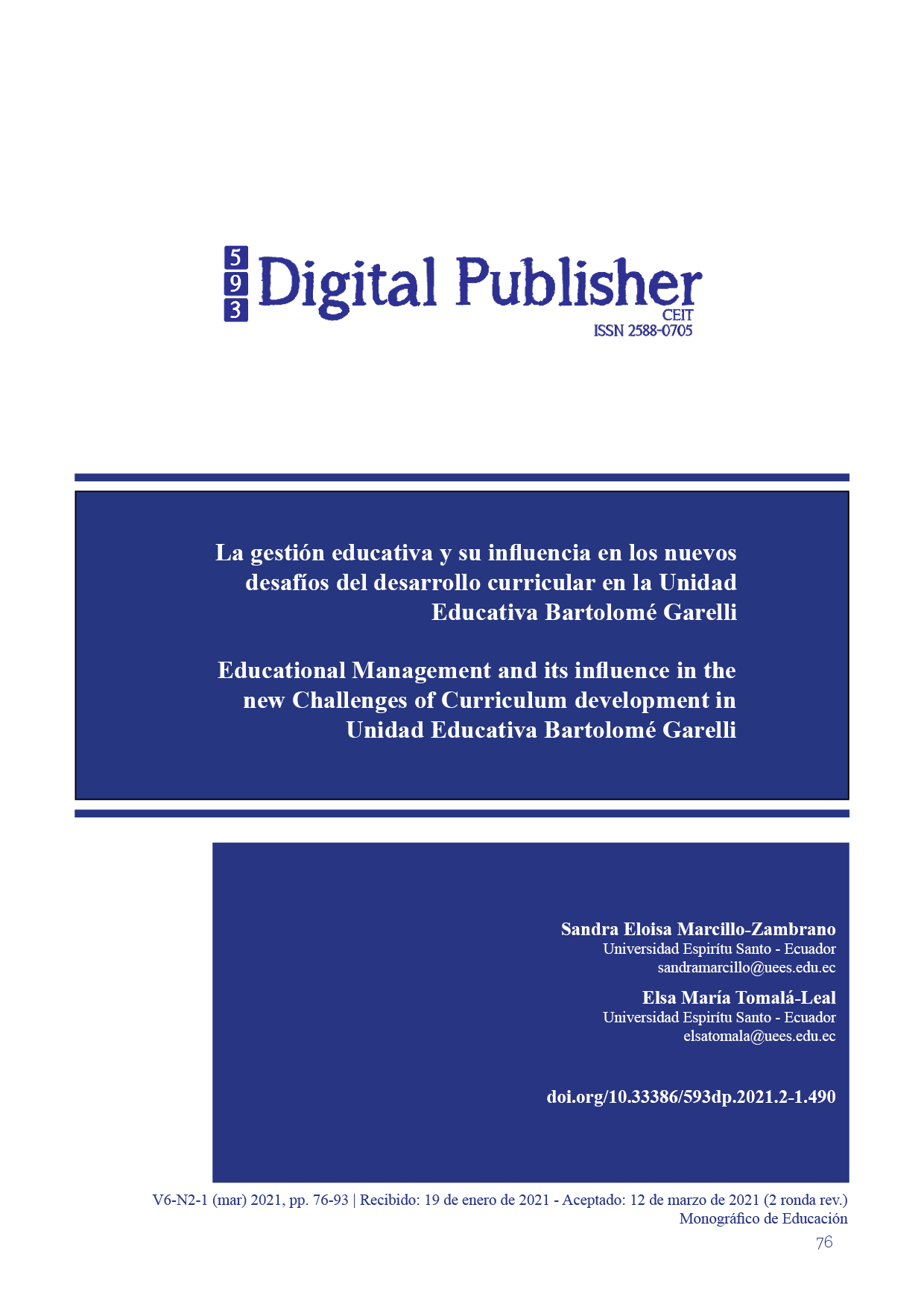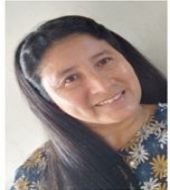Educational Management and its influence in the new Challenges of Curriculum development in Unidad Educativa Bartolomé Garelli
Main Article Content
Abstract
This research is based on the importance of educational management and the new challenges of curricular development that teachers have in these times, in which education has presented notable and great changes, which addresses a social problem that has historical background and which those involved in education have to face in a dynamic and innovative way, for which an adequate educational management will allow the institution to achieve its proposed objectives, together with the entire institutional team, developing an optimal work that help improvements for the benefit of the entire educational community. The purpose of the scientific article is to elaborate a theoretical model aimed at the educational manager in the face of current challenges in education to improve the application of curriculum development in the Bartolomé Garelli Educational Unit. Through the application of the qualitative investigative approach that allows us to study and understand the reality of an observed phenomenon, applying various methodologies, such as: The logical historical method, which allows obtaining the background, the chronological evolution that education has had over the course of the years; the method of scientific modeling, which allows visualizing the educational reality for the creation of theoretical models; the holistic method, which allows to analyze and relate the characteristics of those involved in its field of action. For the compilation of the information empirical methods are used, such as: The interview, the survey and the criteria of experts. This provides us with the necessary information to propose a feasible solution through a theoretical model, which will analyze and understand the characteristics of school management to determine the optimal qualities of the manager to help face the new challenges presented by educational actors. (teachers, parents, students) and education.
Downloads
Article Details

This work is licensed under a Creative Commons Attribution-NonCommercial-ShareAlike 4.0 International License.
1. Derechos de autor
Las obras que se publican en 593 Digital Publisher CEIT están sujetas a los siguientes términos:
1.1. 593 Digital Publisher CEIT, conserva los derechos patrimoniales (copyright) de las obras publicadas, favorece y permite la reutilización de las mismas bajo la licencia Licencia Creative Commons 4.0 de Reconocimiento-NoComercial-CompartirIgual 4.0, por lo cual se pueden copiar, usar, difundir, transmitir y exponer públicamente, siempre que:
1.1.a. Se cite la autoría y fuente original de su publicación (revista, editorial, URL).
1.1.b. No se usen para fines comerciales u onerosos.
1.1.c. Se mencione la existencia y especificaciones de esta licencia de uso.
References
Albornoz, T. C., & Romero, I. J. (2020). Estudio de clases como estrategia de desarrollo profesión al docente. Universidad de concepción, Los Ángeles - Chile. Obtenido de http://repositorio.udec.cl/bitstream/11594/649/1/Albornoz-Torres-%20Romero-Inostroza.pdf
Barrera, E., Barragán, T., & Ortega, G. (11 de Noviembre de 2017). La realidad educativa ecuatoriana desde una perspectiva docente. Revista Iberoamericana. Obtenido de https://rieoei.org/RIE/article/view/2629/3612
Bush, T. (2019). Distinguishing between educational leadership and management: Compatible or incompatible constructs? Educational Management Administration & Leadership, 47 (4), 501-503.
Corral, A., Moya, C., & Alonso, L. (Julio- Septiembre de 2020). Propuesta de la competencia de innovación de procesos educativo: una vía para la formación de profesionales creativos y emprendedores. Luz, 25. Obtenido de file:///C:/Users/Usuario/Downloads/1052-Texto%20del%20art%C3%ADculo-3545-1-10-20200629.pdf
Dirección Nacional de Investigación Educativa. (2019). Instructivo para la presentación de propuestas de investigación educativa en el sistema nacional de educación. Quito- Ecuador. Obtenido de https://educacion.gob.ec/wp-content/uploads/downloads/2019/07/instructivo-propuestas-de-investigacion-educativa.pdf
Fokina, O., Kolupaev, A., Yarovenko, A., Guseva, A., & Ignatyeva, O. (2016). The Place the Competency-based Approach of Education in the Educational Management System. International Review of Management and Marketing, 6, 266-271.
Hernández, R., Fernández, C., & Baptista, M. (2014). Metodología de la Investigación (Sexta ed.). México: McGraw-Hill.
Herrera, M., & Cochancela, M. (2019). Aportes de las reformas curriculares a la educación obligatoria en el Ecuador. Scientific, 5(15). Obtenido de https://www.redalyc.org/jatsRepo/5636/563662155020/html/index.html
Jaramillo, K. (2017). Propuesta de implementación de indicadores de aseguramiento de la calidad para institutos técnicos tecnológicos del Ecuador. Caso: instituto tecnológico superior "República del Ecuador". Quito-Ecuador. Obtenido de http://repositorio.puce.edu.ec/bitstream/handle/22000/14870/Tesis%20Karina%20Jaramillo%2006012018.pdf?sequence=1&isAllowed=y
La Agenda 2030 y los Objetivos de Desarrollo Sostenibles, 2. (2018). Garantizar una educación inclusiva y equitativa de calidad y promover oportunidades de aprendizaje permanente para todos. Obtenido de https://repositorio.cepal.org/bitstream/handle/11362/40155/24/S1801141_es.pdf
Ley Orgánica de Educación Intercultural LOEI. (2015). Ley orgánica de educación intercultural. Quito-Ecuador. Obtenido de https://educacion.gob.ec/wp-content/uploads/downloads/2017/02/Ley_Organica_de_Educacion_Intercultural_LOEI_codificado.pdf
Martínez, S. (2019). Diseño, desarrollo e innovación del currículum en la educación virtual. Guatemala. Obtenido de http://biblioteca.galileo.edu/tesario/bitstream/123456789/958/1/10.pdf
Ministerio de Educación. (2020). Lineamientos para la construcción de la propuesta pedagógica. Quito-Ecuador. Obtenido de https://educacion.gob.ec/wp-content/uploads/downloads/2020/01/PropuestaPedagogica-2020.pdf
Ministerio de Educación del Ecuador. (2020). Plan educativo aprendamos juntos en casa. Quito-Ecuador. Obtenido de https://www.gestionderiesgos.gob.ec/wp-content/uploads/2020/05/Plan-Educativo-Aprendamos-Juntos-en-casa.pdf
Muñoz, É. (2018). El gerente educativo como gestor de conocimiento para las instituciones educativas inteligentes.
Nieda, J., & Macedo, B. (s.f.). Organización de Estados Iberoamericanos para la Educación, la Ciencia y la Cultura (OEI). Obtenido de http://www.oei.org.co/oeivirt/index.html
Obitor, M., & Abe, E. (2020). Globalization and Higher Education: A Challenge for Curricular Innovation for Relevant Education. IOSR Journal of Research & Method in Education (IOSR-JRME), 10, 20-25.
OIE-UNESCO, O. I. (junio de 2017). Herramientas de Formación para el Desarrollo Curricular: Una caja de recursos. Obtenido de http://www.ibe.unesco.org/es
Pedrozo, Z., Fernández, P., & Rapsa, G. (2018). Características del modelo de gestión educativa estratégica en instituciones públicas. Praxis, 14(2), 125-133.
Peña, J., & Almuguer, A. (Octubre de 2019). Modelo de gestión administrativa y financiera para institutos y politécnicos industriales. Luz, 24. Obtenido de file:///C:/Users/Usuario/Downloads/997-Texto%20del%20art%C3%ADculo-2868-1-10-20191001.pdf
Pérez, N. (. (Mayo-Agosto de 2020). Gerencia educativa: Transformación e innovación. Educare, 24(2), 283. Obtenido de https://revistas.investigacion-upelipb.com/index.php/educare/article/view/1330/1300
Ramírez, M., & Quezada, J. (2019). Repensando los indicadores educativos: La Gestión educativa curricular y de vinculación con la comunidad. En R. Ramírez. Costa Rica. Obtenido de https://revistas.uned.ac.cr/index.php/innovaciones/article/view/2483/3153
Vanegas, H., Soto, J., & Sánchez, J. (24 de junio de 2020). Revista de salud pública. Scielo, 48. Obtenido de http://www.scielo.org.co/scielo.php?pid=S0124-00642020000101102&script=sci_abstract&tlng=en
Velasco, T. F., & Prieto, L. Y. (Julio-Septiembre de 2017). El asesor educativo como principal orientador en la comunidad educativa. Luz, 111. Obtenido de https://luz.uho.edu.cu/index.php/luz/article/view/846/779
Yangali, J., Rodríguez, J., Vásquez, M., & Chauhara, J. (2018). La relación de la toma de decisiones y la gestión educativa en docentes gestores de la universidad. INNOVA Research Journal, 3(8.1), 60-76.
Zabalza, M. Á. (1992). Diseño y Desarrollo Curricular. Madrid: Narcea.



